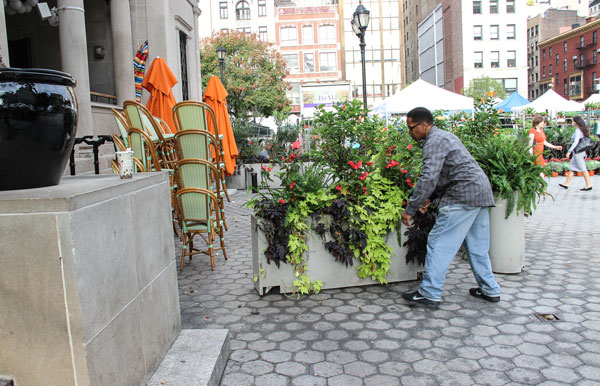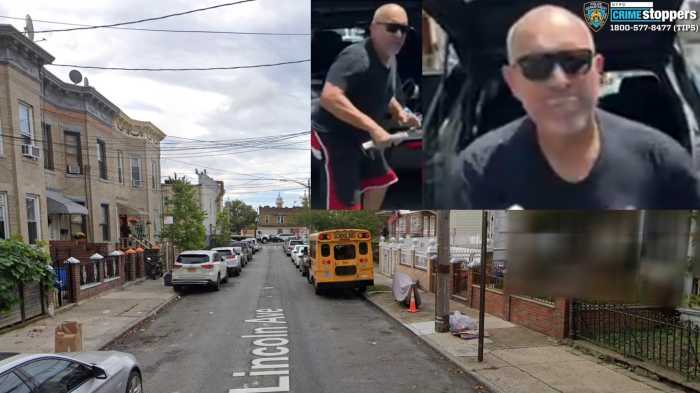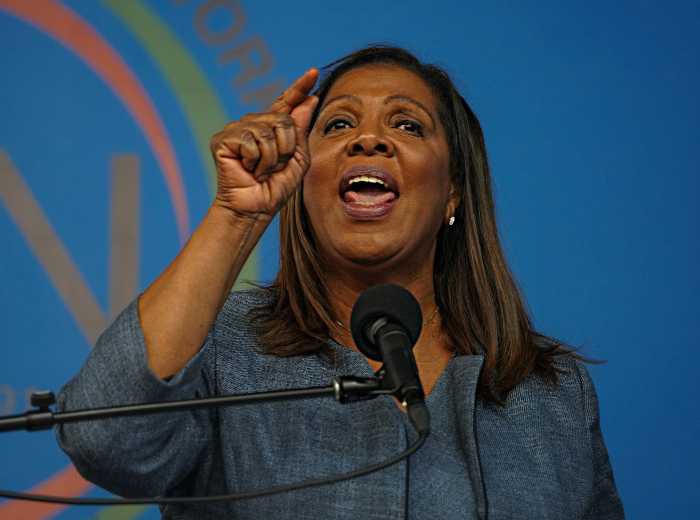
BY LINCOLN ANDERSON | Talk about fast food!
After just a quick six months, it could be the last supper for the Union Square pavilion restaurant — at least as far as its actually being located inside the historic structure.
In a community newsletter mailed to her constituents which they received last week, state Senator Liz Krueger reported that the new seasonal restaurant, the Pavilion Market Cafe, will permanently vacate the structure at the end of this season, which means right around now.
Under the contract with the city, the seasonal concession runs from mid-April to about Oct. 15. There is a little wiggle room depending on which day the restaurant started operating in the spring.
Instead, according to Krueger’s newsletter, from now on, the hotly debated eatery will be confined to the area right outside the pavilion — the exterior tables and chairs it currently has on the hexagonal asphalt pavers just north of the structure. (According to a source, however, this may also include exterior tables and chairs just to the east of the pavilion.)
As for the pavilion itself, it will reportedly be returned to year-round public use as a part of Union Square Park — which is what, for the last half dozen years, opponents of the pavilion restaurant have doggedly fought for.
The concession’s contract reportedly contains a clause allowing the city to cancel it at any time; so the operator probably has little choice but to concede to the city’s new terms.
Jack Taylor, a member of the Union Square Community Coalition, tipped The Villager off to the news this Tuesday.
“All we know is what was in state Senator Krueger’s newsletter,” he said. “Krueger and the other elected officials pushed de Blasio to reverse the agreement. After this summer season ends, in October, the restaurant will be limited to the blacktop area on the northern plaza. This will provide a buffer between the restaurant and the children’s playground.
“It’s a partial victory, at least,” he said, “freeing up the pavilion, which we think should be for community use and programs, not a commercial entity. We’ve been fighting this since 2005.”
A lawsuit spearheaded by U.S.C.C. seeking to block the eatery from use of the pavilion, went all the way to the Court of Appeals, the state’s high court, but ultimately lost. The opponents had argued that the pavilion first needed to be “alienated” by the state Legislature — making it no longer parkland — before it could be used for the private concession.
Taylor wasn’t sure, but he said he thought that, under the revamped agreement, the restaurant’s kitchen, currently located in the pavilion’s basement, would be allowed to remain there.
Not having any more information than what he read in the newsletter, he referred The Villager to Krueger’s office.
Brad Usher, the state senator’s chief of staff, said he was actually the one who added the item about the pavilion restaurant to his boss’s newsletter.
“As of Oct. 15 they’re supposed to be out of the pavilion,” he said, “and after that will be on the blacktop…in the spring.”
Usher said, according to the information he has, while the restaurant will be permanently bounced from the pavilion, he doesn’t know if the kitchen will continue to occupy the pavilion’s basement or not.
At issue, however, is that there is nothing in writing yet from the de Blasio administration confirming what was verbally communicated months ago about the restaurant.
“It was reported to me there was an agreement,” Usher said. “Do I have anything in writing? No. But when it was reported to me, it was that this is done. Given what I’ve seen, I’d be surprised if this is not a real deal.”
According to Usher, Assemblymember Richard Gottfried’s Office actually has taken the lead on the issue.
Wendi Paster, Gottfried’s chief of staff, said a meeting at City Hall occurred back around April between “a lot of elected officials and staff and people from the de Blasio administration.” Paster, who, unlike Usher, actually attended that negotiation, said she is waiting for confirmation of the agreement — which she said was a verbal commitment conveyed to her shortly after the meeting.
“That’s what they said a few months ago, but we haven’t heard, or seen anything further in writing since April,” she said.
Earlier this year, advocates pressured Mayor de Blasio to cancel the contract signed under his predecessor, Mike Bloomberg, for the pavilion restaurant. They noted that as public advocate, de Blasio even wrote to the State Liquor Authority, urging that it deny a liquor license for the establishment. Yet, ultimately, the new mayor didn’t put the kibosh on the pavilion plan. But apparently thanks to the politicians’ ongoing pressure, he may have relented.
Back in early May, when the 160-seat restaurant first opened, the operator’s plan was to be open from 8 a.m. to midnight, complete with breakfasts in the morning. But, according to Geoffrey Croft, who ate there recently, business has been bad — so bad, in fact, that breakfast has been dropped from the menu.
Croft said he went to the place a few weeks ago, and it was deserted of diners.
“I was the only one there,” he said. “Several employees said business has not been good. They had over 100 employees, and they said staff ‘have left in droves.’ It’s hard to staff a seasonal restaurant, especially when business is bad.”
Croft, the founder of NYC Park Advocates, has been a leading opponent of the pavilion restaurant plan.
According to Croft, another local restaurateur who bid on the pavilion contract — yet with a plan to offer food at a lower price point than the winning bid — has declared the Pavilion Market Cafe “a disaster.”
Under the new agreement, the fancy furnishings that Chef Driven Market, the parent company, installed in the pavilion — such as chandeliers and the bar — reportedly would now need to be ripped out.
Croft said the hope is that the kitchen also will be booted from the pavilion’s basement, so that it, too, can be returned to public park use for the community.
“Details are still being worked out with the administration,” he said.
One concern, he noted, is that, after removing the restaurant from the pavilion, the city might want to compensate the operator by providing it with more space outside on the northern plaza. That poses a new problem, the advocate said, since it could impinge on the plaza’s historic function as a place of public assembly for rallies, protests and free speech.
“What we don’t want is to give them more land,” he stressed.
He added that the restaurant’s contract isn’t being canceled per se, but that it’s a “change of venue” — the shunting of the eatery from inside the pavilion to outside it.
As for the uses for the pavilion’s open-air top portion, advocates are thinking along the lines of bringing back children’s uses and former uses, like tango and a Brazilian short-film festival. In a similar pavilion in Columbus Park, the top open portion is “used 18 hours a day,” Croft said. Meanwhile, assuming the kitchen is forced to vacate the Union Square pavilion’s basement, that enclosed space could be used for things like ping-pong, art classes and art exhibits, he added.
Reached by phone late Tuesday afternoon, a hostess at the pavilion restaurant said a general manager was not available to speak just then. However, she confirmed that it’s true the eatery no longer serves breakfast. She declined, though, to answer questions on whether business has been bad and if staff have been deserting, saying that would be for the G.M. to respond to.
However, the city’s Parks Department wasn’t ready to confirm this week — at least not publicly — if the pavilion restaurant will be moved outdoors.
“The city will evaluate the pavilion’s performance during its first season, and make adjustments as deemed necessary to their operation moving forward,” said Parks spokesperson Phil Abramson. He added that the restaurant will operate until Oct. 31 since it opened a bit late, on May 1.
According to a source, the city believes the restaurant had a successful first season, but won’t make a decision until the evaluation is completed.
Croft, though, said there’s a simple solution.
“The contract should have been canceled by the new administration so we don’t have go through all this,” he said, “and so that the interests of children and the greater Union Square community would be protected.”




































